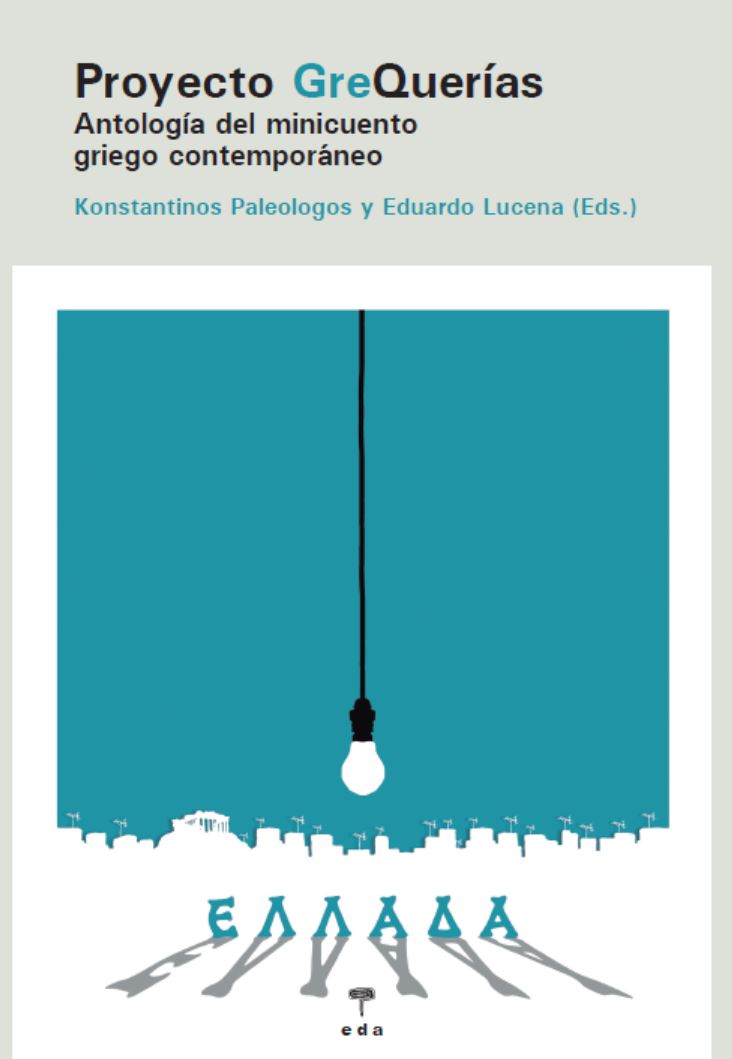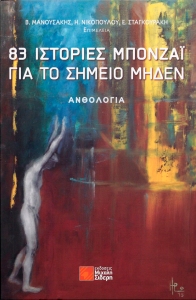Ὄλγα Ἰορδανίδου
Τὸ μέτρημα
 ΤΙΣ ΠΑΡΥΦΕΣ τῆς μέρας τὰ φύλλα τῆς λεύκας πέφτουν. Τὰ παρακολουθεῖ ἔτσι καθὼς ἀποσπῶνται ἀπὸ τὸ κλαδὶ καὶ μὲ ἁπαλὲς χορευτικὲς κινήσεις, διαγράφοντας ἀργοὺς αἰσθησιακοὺς κύκλους, προσγειώνονται στὸ ἔδαφος. Ὥρα τώρα. Μέχρι ποὺ ἔρχεται τὸ σκοτάδι. Τότε ἀρχίζει νὰ μετράει. «Ἕνα, δύο, τρία… τριάντα-ἑφτά, τριάντα-ὀχτώ…». «Δεκατρία» τὴν διακόπτει ὁ Κυριάκος, αἰφνιδιάζοντάς την γιὰ ἄλλη μιὰ φορὰ καὶ κείνη πιάνοντας τὸ νῆμα ἀπὸ τὸ καινούργιο σημεῖο ἐκκίνησης συνεχίζει: «Δεκατέσσερα, δεκαπέντε…». «Καλησπέρα Μεροπάκι» τῆς λέει καὶ ἐνῶ περνάει τὰ χέρια του κάτω ἀπὸ τοὺς ἀσθενικούς της ὤμους, τραβώντας την ἁπαλὰ πρὸς τὰ πάνω, τῆς σκάει ἕνα φιλὶ στὸ μάγουλο. «Εἴκοσι ἑφτά, εἴκοσι ὀχτώ…». « Κατάλαβα» μονολογεῖ ὁ Κυριάκος, « λευκὴ νύχτα θὰ περάσουμε πάλι ἀπόψε». Τὴν συμπαθεῖ. Ἔτσι καθὼς κουρνιάζει συρρικνωμένη μέσα στὰ σεντόνια, μὲ τὰ ἀσθενικά της χέρια σταυρωμένα στὸ στῆθος καὶ τὰ γόνατα λυγισμένα πρὸς τὴν κοιλιά. «Δεκαεννιὰ Μερόπη» τῆς φωνάζει ἐνῶ ἀπομακρύνεται ἔξω ἀπὸ τὸν θάλαμο, δεκαεννιά». Ἔχει συχνὰ ἀναρωτηθεῖ, ἀπὸ ποιό βραχυκύκλωμα ὁρμώμενη τὸ κάνει αὐτό. Στὴν ἀρχὴ τὸν ἐκνεύριζε ὅπως καὶ τοὺς περισσότερους στὴν κλινικὴ δηλαδή. Τοῦ δημιουργοῦσε ἕνα ἄγχος αὐτὸ τὸ ἀσταμάτητο καὶ ἀδικαιολόγητο μέτρημα. Δούλευε καὶ τὴν ἄκουγε, μία ἐπίμονη ὑπόκρουση ποὺ ἔκανε τοὺς χτύπους τῆς καρδιᾶς του νὰ ἐπιταχύνονται, τοῦ ἐπιβαλλόταν μὲ τὸν τρόπο της, τὸν τρέλαινε. Κάποτε τῆς ἔβαλε τὶς φωνὲς μὰ τὸ μετάνιωσε, εὐθὺς μόλις εἶδε τὰ μάτια της νὰ ὑγραίνονται, ἐνῶ συνέχιζε, ἐγκλωβισμένη σὰν τὸν ποντικὸ στὴ φάκα, νὰ μετρᾶ. «Ἑξήντα- ἕξι, ἑξήντα- ἑφτά…». Οἱ συνάδελφοι τὸν ἐπέπλητταν. «Ἄσε την ρὲ σὺ τὴν κακομοίρα, τά ’χει χαμένα, δὲν τὸ βλέπεις; Τὴν παρηγορεῖ.» Κάποιοι γελοῦσαν κρυφὰ μὲ τὴν ἐμμονή του ἀλλὰ δὲν τολμοῦσαν νὰ τὸ σχολιάσουν φανερά. Τὴν ἴδια δὲ φαινόταν νὰ τὴν ἐνοχλεῖ. Ἁπλῶς συνέχιζε μὲ σισύφεια ἐπιμονή, μέχρι ποὺ τὴν ἔπαιρνε ὁ ὕπνος καὶ ἡσύχαζαν καὶ οἱ δύο. Κι ἕνα βράδυ ψηνόταν στὸν πυρετό. Τῆς ἀλλάζει τὰ σεντόνια, τῆς βάζει κομπρέσες στὸ μέτωπο νὰ δροσιστεῖ. «Μέτρα μου λίγο» τοῦ λέει, κι αὐτὸς ἀρχίζει: «ἕνα, δύο, τρία,… , εἴκοσι ἕνα, εἴκοσι δύο…». « Πέντε… Κυριάκο». «Τί πέντε;» τὴ ρωτάει. «Πέντε μῆνες κλείνω σήμερα ἐδῶ» τοῦ ἀπαντάει ἡ Μερόπη καὶ γυρίζει πλευρὸ νὰ κοιμηθεῖ.
ΤΙΣ ΠΑΡΥΦΕΣ τῆς μέρας τὰ φύλλα τῆς λεύκας πέφτουν. Τὰ παρακολουθεῖ ἔτσι καθὼς ἀποσπῶνται ἀπὸ τὸ κλαδὶ καὶ μὲ ἁπαλὲς χορευτικὲς κινήσεις, διαγράφοντας ἀργοὺς αἰσθησιακοὺς κύκλους, προσγειώνονται στὸ ἔδαφος. Ὥρα τώρα. Μέχρι ποὺ ἔρχεται τὸ σκοτάδι. Τότε ἀρχίζει νὰ μετράει. «Ἕνα, δύο, τρία… τριάντα-ἑφτά, τριάντα-ὀχτώ…». «Δεκατρία» τὴν διακόπτει ὁ Κυριάκος, αἰφνιδιάζοντάς την γιὰ ἄλλη μιὰ φορὰ καὶ κείνη πιάνοντας τὸ νῆμα ἀπὸ τὸ καινούργιο σημεῖο ἐκκίνησης συνεχίζει: «Δεκατέσσερα, δεκαπέντε…». «Καλησπέρα Μεροπάκι» τῆς λέει καὶ ἐνῶ περνάει τὰ χέρια του κάτω ἀπὸ τοὺς ἀσθενικούς της ὤμους, τραβώντας την ἁπαλὰ πρὸς τὰ πάνω, τῆς σκάει ἕνα φιλὶ στὸ μάγουλο. «Εἴκοσι ἑφτά, εἴκοσι ὀχτώ…». « Κατάλαβα» μονολογεῖ ὁ Κυριάκος, « λευκὴ νύχτα θὰ περάσουμε πάλι ἀπόψε». Τὴν συμπαθεῖ. Ἔτσι καθὼς κουρνιάζει συρρικνωμένη μέσα στὰ σεντόνια, μὲ τὰ ἀσθενικά της χέρια σταυρωμένα στὸ στῆθος καὶ τὰ γόνατα λυγισμένα πρὸς τὴν κοιλιά. «Δεκαεννιὰ Μερόπη» τῆς φωνάζει ἐνῶ ἀπομακρύνεται ἔξω ἀπὸ τὸν θάλαμο, δεκαεννιά». Ἔχει συχνὰ ἀναρωτηθεῖ, ἀπὸ ποιό βραχυκύκλωμα ὁρμώμενη τὸ κάνει αὐτό. Στὴν ἀρχὴ τὸν ἐκνεύριζε ὅπως καὶ τοὺς περισσότερους στὴν κλινικὴ δηλαδή. Τοῦ δημιουργοῦσε ἕνα ἄγχος αὐτὸ τὸ ἀσταμάτητο καὶ ἀδικαιολόγητο μέτρημα. Δούλευε καὶ τὴν ἄκουγε, μία ἐπίμονη ὑπόκρουση ποὺ ἔκανε τοὺς χτύπους τῆς καρδιᾶς του νὰ ἐπιταχύνονται, τοῦ ἐπιβαλλόταν μὲ τὸν τρόπο της, τὸν τρέλαινε. Κάποτε τῆς ἔβαλε τὶς φωνὲς μὰ τὸ μετάνιωσε, εὐθὺς μόλις εἶδε τὰ μάτια της νὰ ὑγραίνονται, ἐνῶ συνέχιζε, ἐγκλωβισμένη σὰν τὸν ποντικὸ στὴ φάκα, νὰ μετρᾶ. «Ἑξήντα- ἕξι, ἑξήντα- ἑφτά…». Οἱ συνάδελφοι τὸν ἐπέπλητταν. «Ἄσε την ρὲ σὺ τὴν κακομοίρα, τά ’χει χαμένα, δὲν τὸ βλέπεις; Τὴν παρηγορεῖ.» Κάποιοι γελοῦσαν κρυφὰ μὲ τὴν ἐμμονή του ἀλλὰ δὲν τολμοῦσαν νὰ τὸ σχολιάσουν φανερά. Τὴν ἴδια δὲ φαινόταν νὰ τὴν ἐνοχλεῖ. Ἁπλῶς συνέχιζε μὲ σισύφεια ἐπιμονή, μέχρι ποὺ τὴν ἔπαιρνε ὁ ὕπνος καὶ ἡσύχαζαν καὶ οἱ δύο. Κι ἕνα βράδυ ψηνόταν στὸν πυρετό. Τῆς ἀλλάζει τὰ σεντόνια, τῆς βάζει κομπρέσες στὸ μέτωπο νὰ δροσιστεῖ. «Μέτρα μου λίγο» τοῦ λέει, κι αὐτὸς ἀρχίζει: «ἕνα, δύο, τρία,… , εἴκοσι ἕνα, εἴκοσι δύο…». « Πέντε… Κυριάκο». «Τί πέντε;» τὴ ρωτάει. «Πέντε μῆνες κλείνω σήμερα ἐδῶ» τοῦ ἀπαντάει ἡ Μερόπη καὶ γυρίζει πλευρὸ νὰ κοιμηθεῖ.
Πηγή: Πρώτη δημοσίευση.
Ὄλγα Ἰορδανίδου. Σπούδασε ἰατρικὴ καὶ ἐργάζεται ὡς γιατρός. Ἀσχολεῖται χρόνια μὲ τὸ γράψιμο. Στὸ ἱστολόγιό μας δημοσίευσε τὸ πεζὸ «Τὸ μπάσκετ».
Filed under: Ελληνικά,Ιορδανίδου Όλγα,Καθημερινά,Νοσήματα,Πόλη-Χώροι,Περιγραφή,Ψυχογραφία | Tagged: Όλγα Ιορδανίδου,Διήγημα,Λογοτεχνία | Τὰ σχόλια στὸ Ὄλγα Ἰορδανίδου: Τὸ μέτρημα ἔχουν κλείσει










